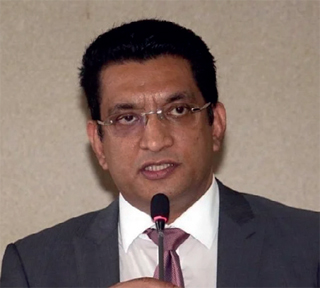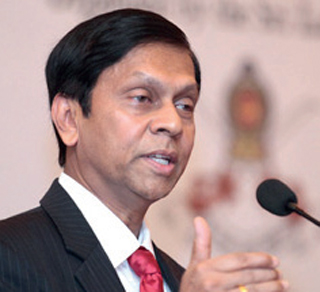Sunday Feb 15, 2026
Sunday Feb 15, 2026
Saturday, 29 May 2021 00:41 - - {{hitsCtrl.values.hits}}
By Charumini de Silva
 |
| Justice Minister Ali Sabry |
 |
| Education Minister Prof. G.L. Peiris |
 |
| State Minister of Money, Capital Market and State Enterprise Reforms Ajith Nivard Cabraal
|
The Government yesterday urged the Opposition and critics not to demonise the Port City, insisting that the venture would serve as a first step in creating a compelling value proposition for Sri Lanka.
Following Speaker Mahinda Yapa Abeywardena signing off on the blueprint on 27 May, the Colombo Port City Economic Commission Act is now in effect and several Government Ministers and State Ministers yesterday yet again cleared out air on the new legislation and of the potential benefits of the country’s iconic development project.
“Sri Lanka is non-aligned and that is our pride as a nation. We are friends of all and open for business with the entire world. It is time we end demonising the whole Port City concept and start to make use of this great opportunity,” Justice Minister Ali Sabry said at a webinar organised by the Government Information Department titled ‘The Colombo Port City: Angel or Devil?’
He was joined by Education Minister Prof. G.L. Peiris and Money, Capital Market and State Enterprise Reforms State Minister Ajith Nivard Cabraal.
“Investment is not charity — it should be mutually beneficial to both the country as well as the investor,” Sabry said, elaborating why the Port City Economic Commission Act was introduced.
Noting that protection of investment, transparent mechanism and legal framework, return on investment (ROI) and repatriation of profits were fundamental in any investment, he said everything was now transparent, logical and open for business.
“Unanimously we all agree that Colombo Port City is critical for future economic growth and the need for regulations to govern it. The Act is identical to what the Board of Investment (BOI) is providing now,” Sabry said.
Responding to criticism of the Port City Economic Commission Act, Education Minister Prof. Peiris said that Parliament was supreme in taking decisions and the statutory provisions crucial in terms of accountability, rule of law, democratic governance were preserved intact in operating the Port City.
He also denied allegations that the new Act would enable the Port City to be a haven for money laundering, noting that the Monetary Law, Financial Transaction Reporting Act and Money Laundering Act were all part of the laws that applied within the Port City.
“All of Sri Lanka’s statutory laws operate fully within the Port City, except the statutes that are specifically mentioned in Schedule III — such as the Urban Development Authority (UDA), Municipal Council Ordinance, Commercial Mediation Centre and Town and Country Planning. This is to prevent the investor from going from pillar to post. Instead of that, the Commission will serve as a single-window opportunity,” Prof. Peiris said.
He also said that there were a series of safeguards clearly set out in the new Act, compared to both provisions in the Greater Colombo Economic Commission of 1978 and Board of Investment Law of 1992.
State Minister Cabraal reiterated that the Port City would be a turning point in Sri Lanka’s economic history.
“The next few years will unfold Sri Lanka’s proper potential through the Port City. We will soon conduct roadshows to invite the world’s top businessmen and business institutions to be part of this great city,” he said.
Cabraal said although the development of the infrastructure had been done in partnership with an investment of $ 1.4 billion which came in as a Foreign Direct Investment (FDI), to project the Port City to the rest of the world was an effort the Government has to spearhead and it would be done through the Commission.
He said Port City would add around $ 4.5 billion to the Gross Domestic Product (GDP) of the country in the first few years and thereafter at a rate of around $ 12 billion of additional GDP. This would make a vast difference to our $ 80 billion GDP country.
“People of our country will be able to work inside the Port City and will be able to earn in dollars without having to leave for overseas jobs,” he added.
“We do not want to miss the bus this time. We need to put that narrative behind and turn a new chapter in Sri Lanka’s economic history,” he said.
The State Minister also said that the new commission would also set out its master plan for promoting and attracting investment and protecting them.
“The best time is now to invest. Once the project gets traction from the rest of the world, it will not be cheap as it is now,” he quipped.